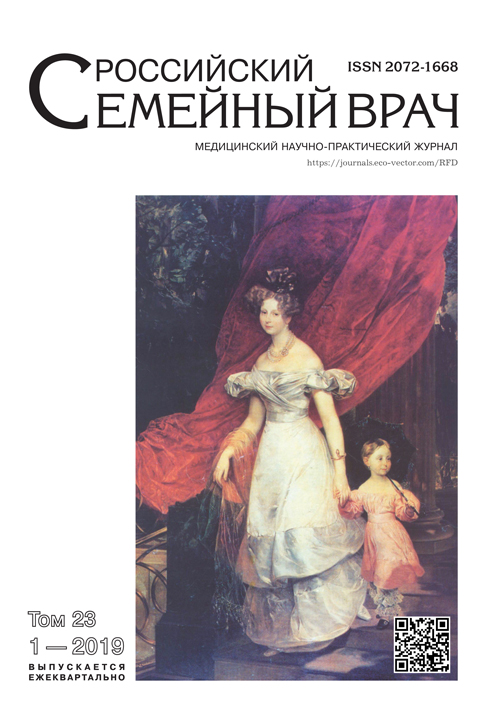Том 23, № 1 (2019)
- Год: 2019
- Выпуск опубликован: 30.05.2019
- Статей: 5
- URL: https://journals.eco-vector.com/RFD/issue/view/657
- DOI: https://doi.org/10.17816/RFD20191
Лекции
Недостаточность питания в пожилом и старческом возрасте
Аннотация
Распространенность недостаточности питания у людей старше 60 лет составляет 10–40 %. Недостаточное питание ухудшает качество жизни и функциональный статус пациентов пожилого и старческого возраста. Развитие нарушений питания может быть связано с различными факторами. Диагностика недостаточности питания направлена на ее выявление и поиск причин. Лечение должно быть комплексным, включающим адекватную нутритивную поддержку и коррекцию факторов, приведших к развитию недостаточности питания. Необходимо помнить, что некоторые нарушения питания могут стать причиной развития или прогрессирования различных гериатрических синдромов (падений, недержания мочи, когнитивных расстройств, депрессии и т. д.).
 5-15
5-15


Научный обзор
Кардиореабилитация сегодня: возможности и трудности
Аннотация
Перед российским здравоохранением стоит задача снижения смертности и инвалидизации пациентов с ишемической болезнью сердца. Важную роль в этом играют амбулаторные программы реабилитации и вторичной профилактики. В нашей стране пока недостаточно развита общедоступная система ведения кардиологических пациентов в условиях первичного звена здравоохранения с акцентом на немедикаментозные методы лечения, несмотря на многочисленные доказательства их эффективности. Это связано с отсутствием материально-технической базы, достаточного количества специалистов, недооценкой этого метода лечащими врачами и низкой мотивацией пациентов к следованию рекомендациям по модификации образа жизни. Такое поведение больных можно охарактеризовать как «иррациональное».
 17-26
17-26


Статьи
Новые рекомендации по ведению больных сердечно-сосудистыми заболеваниями и результаты клинических исследований: материалы Конгресса Европейского общества кардиологов 2018 г.
Аннотация
В статье представлена информация об изменениях в рекомендациях по артериальной гипертензии, рекомендациях по синкопальным состояниям, результатах клинических исследований по применению анти коагулянтов и антитромботических средств, новые данные об эффективности скрининга фибрилляции предсердий. Большое внимание уделяется использованию современных информационных технологий в диагностике и профилактике сердечно-сосудистых заболеваний. Обзор представлен по материалам Европейского конгресса кардиологов 2018 г.
 27-34
27-34


Оригинальное исследование
Первичная аккредитация. Пути решения проблем, связанных с подготовкой выпускников медицинских вузов
Аннотация
Статья посвящена изучению проблем, связанных с подготовкой выпускников медицинских вузов. Цель исследования — определить возможные пути оптимизации подготовки студентов к практическому экзамену в условиях симуляционного центра с учетом их образовательных потребностей. Для оценки отношения студентов к выбору оптимального метода подготовки была разработана анкета, включавшая вопросы о социально-демографических характеристиках респондентов, наиболее сложных станциях практического экзамена, выборе оптимального метода подготовки и уровне вовлеченности студентов в процесс самоподготовки к экзамену в период обучения на шестом курсе. Статистический анализ данных выполнен при помощи программы SPSS 20.0 (SPSS Inc., Chicago, США). В исследовании участ вовали 100 человек, отобранных случайным образом из числа студентов шестого курса лечебного факультета СЗГМУ им. И.И. Мечникова. Анализ полученных данных показал, что по мнению студентов наиболее сложными станциями являются «Оказание экстренной медицинской помощи» и «Неотложные состояния», среди предложенных методов подготовки наибольший рейтинг получила подготовка с преподавателем в условиях симуляционного центра. На данный выбор не оказали влияния ни социально-демографические характеристики, ни форма финансирования обучения. Несмотря на высокую оценку сложности этих станций, число пытавшихся заниматься их освоением путем проработки материалов, размещенных на сайте fmza.ru, составило всего 40 %. Выводы.1. Наиболее сложными для студентов стали навыки оказания экстренной и неотложной медицинской помощи. На данный выбор не оказали влияние ни пол, ни возраст, ни опыт работы в системе здравоохранения. 2. Необходимо внесение изме нений в программы обучения студентов медицинских вузов в соответствии с требованиями профессионального стандарта участкового терапевта, в трудовые функции которого входит оказание неотложной или экстренной медицинской помощи пациенту. 3. Вовлечение преподавателей в процесс подготовки студентов к оказанию экстренной и неотложной помощи должно начинаться на пятом курсе и носить систематический характер. 4. Необходимо мотивировать студентов к планомерной самостоятельной проработке материалов по оказанию экстренной и неотложной помощи, представленных на сайте Федерального методического центра аккредитации.
 35-40
35-40


Медицинское образование
Инновационные методы обучения: опыт проведения ежегодной весенней школы практической гериатрии
Аннотация
В статье на примере образовательного проекта «Ежегодная весенняя школа практической гериатрии» анализируются особенности современного преподавания гериатрии, обосновывается необходимость использования инновационных методик для эффективного и быстрого обучения гериатрии в соответствии с потребностями общества и официальными правительственными документами.
 41-48
41-48












